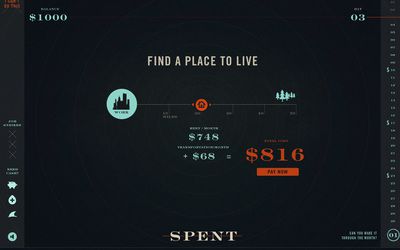Can you make ends meet, Owatonna Ted revealed, preserving a history of shame, Alzheimer’s and the baby boomer, and balloon popping 101.
1) COULD YOU MAKE ENDS MEET IF YOU LOST YOUR JOB?
You’re one of 14 million unemployed Americans, you’ve lost the house, you’ve got $1,000 left. Can you make it through the month?
Urban Ministries of Durham, a faith-based organization “that provides food, shelter, and clothing to those in need in Durham, North Carolina,” created an online game months ago to help people identify with the problems faced by the unemployed.
It says something, perhaps, that we need games to get us to think about these issues, but that’s the way we are. The game presents a series of challenges that require tough choices about work, where you live and what you can provide your family. Each decision leads to consequences.
Do you smash the kids’ piggybank for $15? Donate plasma?
Play it here. (h/t: Erica Mauter, Julia Schrenkler)
2) TED REVEALED
Ted has been found. Yesterday, we told you about “Ted from Owatonna,” who was driving by a Faribault house, noticed it was on fire, stopped to put it out, and then left without revealing his true identity.
He’s Ted Leon, the Faribault Daily News/Owatonna People’s Press has revealed.
“I looked in the window and I could see a little girl with her back to the door,” Leon said. “So, I broke the screen and pounded on the window. It was very hot by then. I was concerned because I didn’t know what was on fire. If there was a grill with a propane tank, I didn’t want to be anywhere near it.”
Once Leon was satisfied Kristin Klocek and her daughter — the girl Leon saw — were aware of the fire and leaving the home, he jumped off the deck and ran to the side of the house. He saw a water spigot so he turned it on, grabbed the hose and ran.
Why didn’t he stay around for the accolades? He was late for church, the paper reported.
“It’s nice to be able to put your faith into practice and help someone,” he told Minnesota Prairie Roots.
More fire: “This fire is a monster,” an MPR listener from Ely wrote overnight. The wildfire in the BWCA. “The reports I hear say it is up to 70,000 acres! We will pass the Ham Lake fire in a day if that’s the case. It has gone 16 miles east in just 8 hours today! ” Roger Nyquist said.
How did it start? This way. Jeff Niemasz of Minneapolis was camping on nearby Malberg Lake the night the fire started.
Storm on Malberg Lake from Jeff Niemasz on Vimeo.
The fire exploded yesterday and is now burning outside the wilderness, too. Fire officials last night said they didn’t have the proper resources to fight it, the Duluth News Tribune reports. Find images here.
Meanwhile, in Logan Utah yesterday, a motorcyclist was rescued from beneath a burning car by people passing by.
There are heroes all around us, of course. Stephen Colbert reports…
France has a dilemma. Should Adolph Hitler’s Atlantic Wall be preserved as part of the country’s heritage? Many sections have already slipped into the sea and its history lost forever, the BBC reports. But when the last World War I veteran died a few years ago, interest in preserving disappearing World War II history intensified.
But, the BBC says, doing so is reminder of France’s dark involvement…
The fortifications were after all German fortifications – emblems to the French of their own national humiliation. But there is more to it than that – the Wall was not just a symbol of defeat – but of collaboration.
“A lot of French construction companies got very rich out of building the Wall,” said Jerome Prieur, author of a 2010 book, Le Mur Atlantique.
“After the war, France needed those same companies for the task of reconstruction. So no-one said anything. There was a wilful blindness, in which everyone was complicit.”
4) ALZHEIMER’S AND THE BABY BOOMER LEGACY
From time to time on NewsCut, we hear from a younger generation that considers Baby Boomers the generation that ruined the country and their own futures.
Maybe our contribution to them may come from the way we die. Thanks to our abundance, and the abundance of us with dementia, we have “a unique opportunity, maybe an opportunity of a lifetime in a sense, to really have an impact on this disease,” says Dr. Ronald Petersen of the Mayo Clinic, who chairs a committee that later this month begins advising the government on what that plan should include. The Associated Press has the story today.
While we were paying attention to political debates with silly talking points, thousands — tens of thousands — of people who provide care to Alzheimer’s victims have been turning out at town meetings to urge a national strategy be developed.
They demand to know why the National Institutes of Health spends about six times more on AIDS research than on Alzheimer’s, when there are good drugs to battle back the HIV virus but nothing comparable for dementia.
Overwhelmingly, they ask for resources to help Alzheimer’s patients live their last years at home without ruining their caregivers’ own health and finances.
“Either you’re rich and can afford $25 an hour for care at home, or you send him to a facility. We’re in the middle of the road,” says Shirley Rexrode of suburban San Francisco, whose 85-year-old father, Hsien-Wen Li, was diagnosed with Alzheimer’s nearly three years ago.
Related: Researchers are reporting encouraging results of a nasal spray containing insulin.
Watch the full episode. See more PBS NewsHour.
5) BALLOON POPPING 101
This is the time of the year when last year’s high school seniors head off to college and start posting pictures on Facebook of their team-building activities just prior to the start of classes.
At the University of Minnesota yesterday, they tried to set the world record for popping balloons.
There is a lesson in this — a metaphor, you might say — though offhand we don’t know exactly what it is.
Bonus: This video from last night’s debate is making the rounds on the InterTubes:
But the question was flawed and, as such, so is the interpretation. It would have been better if “a healthy 30-year-old,” had been substituted by “a 70-year old with Parkinson’s” or “a four-year-old daughter of a woman who is in a shelter because she was beaten by her husband.”
Historically, taking care of “the most vulnerable” has been something many people agree on as a legitimate role for the government, at least more so than “taking care of the healthy.” Over the last few years, the definition of who constitutes “the most vulnerable” among us has been shifting, yet few questioners are asking for a particular candidate’s definition of what that means.
The question Wolf Blitzer asked last night could’ve been modified to answer it and provide something more substantive.
TODAY’S QUESTION
Social Security is a hot topic in the race for the Republican presidential nomination. One candidate has called the program a “monstrous lie” and a “Ponzi scheme.” Today’s Question: Are you counting on Social Security to be there when you need it?
WHAT WE’RE DOING
Midmorning (9-11 a.m.) – – First hour: As the President focused on a jobs bill, one of the underlying causes of the recession is getting less attention. How will homeowners, banks and the government dig out of America’s housing crisis?
Second hour: Martin Sheen and Emilio Estevez have hit the road to promote their new film “The Way,” which depicts a father’s attempt to complete a pilgrimage started by his son. The real-life father and son join Midmorning to discuss the film and the family business.
Midday (11 a.m. – 1 p.m.) – First hour: Henry Aaron of the Brookings Institution explains the past, present and future of Social Security.
Second hour: Broadcast of the GOP presidential debate sponsored by CNN and the Tea Party Express in Tampa
Talk of the Nation (1-3 p.m.) First hour: Israel under siege.
Second hour: Playwright Tony Kushner
All Things Considered (3-6:30 p.m.) – At the close of the 20th Century, Roger Ebert was was among the most influential voices in the film business. His review could result in long lines at the box office or shorten some movie’s runs. Now cancer has robbed Ebert of his voice but he continues to churn out reviews and enjoy movies. NPR visits with Ebert.


